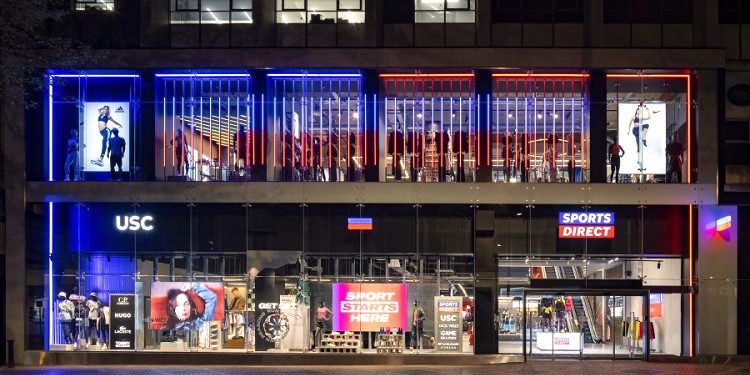Sports Direct’s ambitious revamp of their flagship premises and retail customer experience is well under way. But as ‘experiential retail’ hits the news again and hope rebounds for bricks and mortar, are facilities managers equipped for the challenge?
Experiential is the trend that keeps on re-emerging as the answer to the High Street’s woes. With the opening of the new Sports Direct store in Birmingham, it’s back in the headlines once again:
"I believe if you give people a reason to come and shop, they will shop. They've just not had a reason for the past few years" says Michael Murray, the new CEO at Fraser’s Group.
The new broom at Sports Direct has certainly swept clean, with a £10 million makeover of its flagship next-gen space in London and another multi-million-pound renovation at their new Birmingham store.
LED by example?
In London, there are huge LED displays to maintain, vast video walls, and pillar displays incorporating over 100 million pixels. Around the store are small touch screens replacing real-world store assistants, with scanning devices available to give more information about products as and when required. There are interactive booths allowing customers to create UGC for upload to social media, and cameras everywhere relaying real-time footfall stats for big-data analysis of customer trends.
Sport Direct’s revamp in Birmingham
In Birmingham experiential highlights within their new store include
- Sports bra fitting studio
- Customisation facility for limited edition designs
- Permanent golf putting green
- Running gait analysis machines
These new features are designed to generate footfall to stores and reinvigorate the ailing high street. They’re seen as key to saving and reinventing brands that have lost much of their lustre in recent years.
Experiential drives excitement, but increases risk of failure
Novelty, publicity, and great experiences will certainly drive visits, but equipment is likely to take quite a pounding by an excited public over the next year.
Sports Direct, no doubt, have it covered. But as other brands and other sectors look to capitalise on the experiential trend, are they going to be caught short on the long-term requirements for maintenance and upkeep?
After all, what’s worse than no footfall? Tired, dirty and malfunctioning technology designed for public interaction that’s always ‘out-of-order’? Roped off areas and unresponsive screens that fail to attract customers or collect revenue?
Facilities Management and Experience Economy
"The under-35s - the discovery crowd - are crying out for a more immersive experience. They want to go around ticking boxes, trying things and taking pictures. Conventional retail is dying because it doesn't offer an experience, so you see all kinds of fashion and food outlets are having to offer much more of an event to guests and customers than they have ever done before."
Jonathan Downey, co-founder of London Union.
The experience economy is taking flight in many different sectors right now. In hospitality, particularly, the trend is promising to add value to operations with traditionally narrow margins.
One growing brand that has embraced the experiential challenge in all its complexity is Red Engine.
The hospitality company and owner of the Flight Club and Electric Shuffle brands have reinvented traditional pub games for the experience economy. Digital oches and shuffleboards are differentiating their hospitality offerings from thousands of others. They’re luring the young onto the high street again promising more fun for customers, more loyalty, and more revenue for their venues.
But the technology really has to work for these attractions to be a success, as whole nights out are dependent on the efficient interaction between facilities, services and equipment.
Ex-NASA scientist ups his game
Designed by ex-NASA scientist and astrophysicist Jason Dale, Flight Club’s tech uses advanced camera tracking and mathematical computation to deliver the games that punter’s love. It’s making the fun seamless, but upping the risk of disappointment through equipment failure.
It’s the promise of technology that’s driving the crowds in and the great experience at every level that’s keeping them there. But managing that experience is often down to FM, juggling the reporting of failures, maintaining and cleaning equipment, ensuring seamless access to the oches.
Red Engine: A technology company wrapped in a hospitality brand
"We’re really a technology company wrapped in a hospitality brand”, says Red Engine’s Facility Manager Louis Atkins. “We have complex technical assets to maintain as well as the normal maintenance needs of a busy hospitality brand.”
And as the brand grows nationally and internationally, delivering on all these requirements at the same time has led them to find the CAFM tech that can support those needs.
The team at Flight Club now align their technology values with their CAFM partner. Rather than being bound to laptops, the team on the ground exclusively use their mobiles to report problems and share images of complex issues with engineers to speed up fixes. Engineers use their mobiles to report on progress and tell staff on the ground when their problem has been resolved.
In turn, managers have the kind of big data they need to monitor engineer time, manage budgets, control costs and analyse trends in asset performance.
Their use of a 'mobile first' CAFM system is helping them centralise control and data analytics to maintain and optimise the quality of a customer experience that’s critical to their success.
FM lessons from the experience economy
In the experience economy, the FMs job is so much more than keeping the lights on. In this world they are vital to maintaining different kinds of value-adding equipment. Now, to the normal list of escalator, lift maintenance and H&S checks, you might add the handling of NASA grade motion detection technology!
But more than this, you can also add responsibility for maintaining the emotional engagement of your customers.
From the electronic pub games that make a night out truly memorable to the UGC booths where you can test your sporting prowess and brag about it on social media - assets are brand ambassadors as never before.
Now, more than ever, as brands embrace experiential, it’s essential that their FM strategies scale with their ambitions. After all, there’s nothing worse than a closed attraction.
.png?width=680&height=700&name=Ai%20page%20module%20(2).png)



